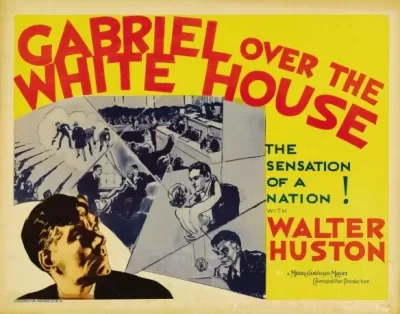Shortly after he is elected President of the United States, bachelor Judson C. Hammond hires Harley Beekman as his general secretary and longtime friend Pendola “Pendie” Molloy as his confidential secretary, and holds a press conference in the White House. When asked by reporters about the problems of unemployment, racketeering, foreign debt and hunger, Judson responds only with vague, optimistic platitudes, then announces that his answers are “not quotable.” Disturbed by Judson’s cavalier attitudes, Pendie gently tells her boss that he should take his duties more to heart and “do important things.” Instead, Judson, under the influence of Jasper Brooks, his Secretary of State, continues his course of indifference and ignores the protests of John Bronson and his growing “army of the unemployed.” Judson’s attitudes change, however, when he is involved in a high-speed car accident and is plunged into a life-threatening coma. Although his doctors predict that he will die, Judson suddenly regains complete consciousness and spends two weeks in bed “thinking.” When he finally emerges from his rooms, a thoughtful but energetic Judson orders Pendie to make contact with Bronson. To the surprise of his Cabinet officers, Judson defends Bronson and his right to march on Washington and fires Brooks when he challenges this new stand. Judson also changes his press policy, answering reporters’ questions at length and allowing them to quote him for the first time. While the rejunevated Judson is busy implementing his new ideas, Antone Brilawksi, a notorious New York bootlegger and racketeer known as Nick Diamond, tries to bribe Bronson to halt his protest march to Washington because the presence of Bronson’s camped “army” in the city distracts the local police from Diamond’s illegal activities. When Bronson bravely refuses Diamond’s bribe, he is shot and killed by Diamond’s henchmen as he is leading his protest marchers out of the city. Against the wishes of his Secretary of War, who wants to send in troops to stop the march, Judson allows the protest to continue and even visits the marchers’ camp to announce the creation of a federal “army of construction,” which will employ thousands to build new roads and buildings. After Pendie confides in Beekman, with whom she has fallen in love, her belief that Judson has been inspired by the spirit of God’s messenger, Archangel Gabriel, Judson demands the resignation of all his Cabinet members. Judson then addresses the Congress and, after requesting that a national state of emergency be declared, asks that Congress relinquish its power voluntarily to him. When various Congressmen accuse him of creating a dictatorship, Judson responds that his dictatorship is based on Thomas Jefferson’s definition of democracy–“a government for the greatest good of the greatest number.” Fed up with bureaucratic resistance, Judson declares martial law and uses his presidential powers to dismiss the Congress. As his first act under martial law, Judson undertakes to have the prohibition amendment repealed and calls Diamond to the White House. After Judson informs the gangster that the government is going to “muscle in” on the liquor selling “racket,” Diamond orders a bomb attack on a government liquor store and tries to assassinate Judson. Outraged by Diamond’s attack, in which Pendie is seriously wounded, the president assigns Beekman to oversee a task force that will eliminate the country’s racketeers. Using tanks and machine guns, Beekman and his men force Diamond’s gang out of their hideout and, after a military trial, execute them. Judson then deals with the problem of foreign debts by calling a conference on his presidential yacht and threatening various world leaders with American military build-up if they refuse to stop their own excessive military spending. By blowing up two American battleships in front of his peers, Judson demonstrates his commitment to disarmament and encourages his allies to sign a peace covenant and repay their foreign debts. After all of the world leaders sign the historic covenant, a weak and weary Judson puts his own name on the document, then, with his life’s work done, dies. More on Wikipedia
Watch Gabriel Over the White House (1933)






